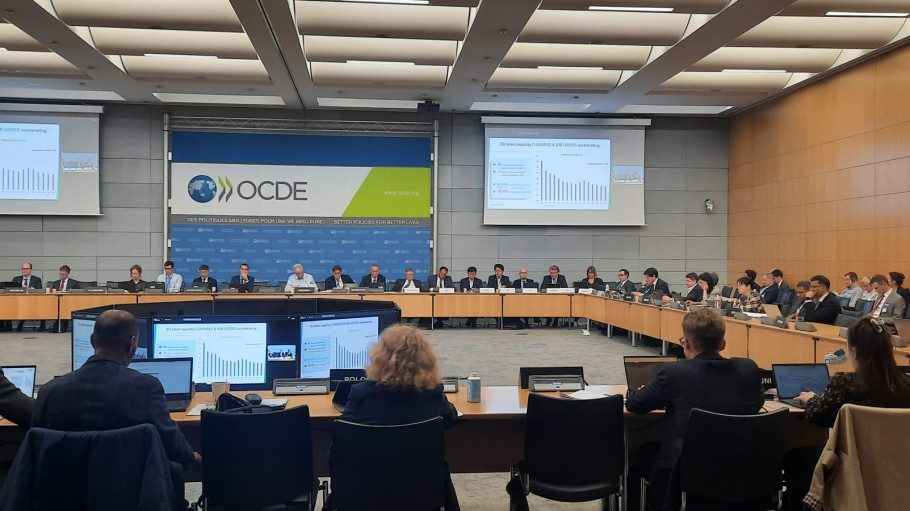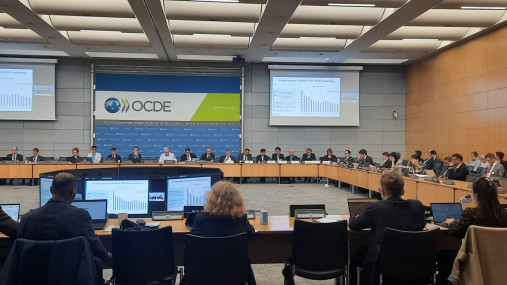
Press releases » Latest OECD global overcapacity data show ever-worsening trend confirming the urgent need for strong EU steel post-safeguard measures, says EUROFER
Latest OECD global overcapacity data show ever-worsening trend confirming the urgent need for strong EU steel post-safeguard measures, says EUROFER
Downloads and links
Recent updates

Brussels, 2 April 2025 - The latest data unveiled by the OECD in its meeting in Paris draw an extremely worrying picture, where global steel excess capacity is expected to grow from an estimated 602 million tonnes in 2024 to 721 million tonnes by 2027 – over five times the EU's steel production. The European steel industry - already severely hit by the spill-over effects of global overcapacity and the U.S. steel import tariffs - reiterates the crucial need for strict and effective EU post-safeguard measures to ensure its survival.
"The trends illustrated by the OECD prove that the global steel overcapacity problem not only remains unsolved but it’s constantly and significantly worsening. This unsustainable situation points to the shortcomings of the EU safeguards where the growing disconnection between imports allowed into the EU market and actual demand cannot be addressed", said Axel Eggert, Director General of the European Steel Association (EUROFER).
"The European Commission must now walk the talk and deliver as soon as possible on a post-safeguard trade measure with a highly effective level of protection as envisaged in the European Steel and Metals Action Plan.", added Mr Eggert.
Contact
Lucia Sali, Spokesperson and Head of Communications, +32 2 738 79 35, (l.sali@eurofer.eu)
About the European Steel Association (EUROFER)
EUROFER AISBL is located in Brussels and was founded in 1976. It represents the entirety of steel production in the European Union. EUROFER members are steel companies and national steel federations throughout the EU. The major steel companies and national steel federation of Turkey, Ukraine and the United Kingdom are associate members.
The European Steel Association is recorded in the EU transparency register: 93038071152-83.
About the European steel industry
The European steel industry is a world leader in innovation and environmental sustainability. It has a turnover of around €191 billion and directly employs around 303,000 highly-skilled people, producing on average 140 million tonnes of steel per year. More than 500 steel production sites across 22 EU Member States provide direct and indirect employment to millions more European citizens. Closely integrated with Europe’s manufacturing and construction industries, steel is the backbone for development, growth and employment in Europe.
Steel is the most versatile industrial material in the world. The thousands of different grades and types of steel developed by the industry make the modern world possible. Steel is 100% recyclable and therefore is a fundamental part of the circular economy. As a basic engineering material, steel is also an essential factor in the development and deployment of innovative, CO2-mitigating technologies, improving resource efficiency and fostering sustainable development in Europe.

Download files or visit links related to this content
Brussels, 26 February 2026 — Europe’s steel industry has warned that the current draft Industrial Accelerator Act could direct public support for low-carbon steel to producers outside the European Union, unless lawmakers include and tighten ‘Made in Europe’ provisions.
Brussels, 24 February 2026 - Europe’s energy-intensive industries have set out a series of proposals to ensure that the EU’s upcoming Electrification Action Plan delivers on its objectives to stimulate and boost electricity consumption in industry. In a joint position paper, industries warn that persistently high electricity prices risk undermining industrial competitiveness and decarbonisation efforts. They call for a policy framework that will enable EU industry in pursuing decarbonisation and industrial competitiveness.
Energy-intensive industries (EIIs) provide direct employment to around 2.6 million people in the EU and represent the foundations of critical and strategic value chains for the EU economy and society. The current economic and energy outlook of the European Union is making investments in electrification and the continued business operation of our sectors at serious risk, should the energy-cost challenge not be solved.